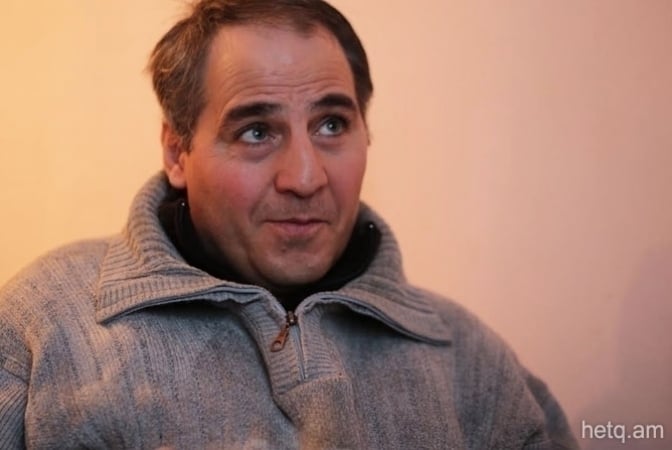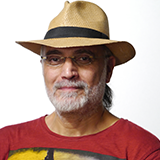
On March 16, Artur Sargsyan, known as the “bread bringer,” passed away after undergoing major surgery.
Last July, when the armed group Sasna Dzrer seized a Yerevan police building, Artur Sargsyan took bread to the members of the group, risking his life, breaking through the police cordon, from where bullets escorted his car.
The “bread bringer” was arrested in July with the others, released in December, but again detained in February. He declared an indefinite hunger strike in protest. He was released in March only after 27 MPs intervened.
News of Sargsyan’s death took over Facebook. Pain, anger, sorrow, and several attempts at cold judgment. Calls for streets to be named after him, even renaming Republic Square; accusations that the authorities killed him, if not directly then at least by twice imprisoning a sick man, whose guilt remained incomprehensible to a large segment of the public.
Naturally, it was interesting how the TV stations would deliver the news.
ATV generally did not cover Sargsyan’s death. ArmNews likewise didn’t provide any information, counter to the word “news” in its name (except for its 9 pm broadcast, which is allotted to the news of another TV company, A1+).
Armenia’s Public TV, Kentron TV, Armenia TV, AR TV, and H3 didn’t include the news of Sargsyan’s death in their opening bulletins highlighting news of general interest, but they did briefly mention the news, stressing that the surgeon didn’t consider Sargsyan’s death to be the result of his hunger strike.
H3 dedicated the first 10 minutes to the campaign meetings of another Artur (Artur Baghdasaryan) and his newly created party — that is, considering it 10 times more important than news that shocked the public, and than, say, the head of state Serzh Sargsyan’s visit to Moscow.
Kentron TV, the control of which is linked to businessman, MP Gagik Tsarukyan, at the end of the news conveyed Tsarukyan’s deep condolences to the relatives of the deceased and declared that the Tsarukyan Alliance’s campaign would be put on hold till the end of the next day. Why Tsarukyan so highly esteemed Sargsyan that he took the major step of suspending his campaign was in no way explained. In any case, you won’t find Tsarukyan’s. name in the list of 27 MPs whose efforts released the “bread bringer” only days earlier.
Four TV companies — H2, Yerkir Media, Shant TV, and Ararat TV — included Sargsyan’s death in its main news bulletin, the first two even began their broadcasts with this news.
What was bothering the TV companies, the majority of which also kept silent on the march dedicated to the “bread bringer” from Freedom Square to the Ministry of Justice building, with its fairly edgy slogans? If 25 years later, anyone watches the March 16, 2017 news broadcasts, they won’t realize the public resonance of this news, or the need to cover the incident.
The TV stations didn’t deliver the main story, that Artur Sargsyan, the “bread bringer,” had become a symbol for many people.
During the seizure of the police compound, there were thousands-strong demonstrations and marches in Yerevan and other cities around the country in support of Sasna Dzrer. When it became known that the group’s members were deprived of bread and water, many urged and demanded the government to show magnanimity and humanity, but it was Artur Sargsyan who decided he had to do something and took food to the group’s members.
Between his two arrests, the “bread bringer” gave an interview to Hetq, where he evaluated his deed very modestly, but he urged people to help all those in need and so fight the authorities, which are not fulfilling their duties.
That is to say, if it’s not possible to change government through lawful means, it must be replaced… at least to the extent of your abilities.
There were so many posts on social media on March 16 that some even complained about the abundance. But this abundance is easy to explain: people are more reserved if they know that their mood and public concern will be properly (through experts, commentators, polls or through more comprehensive information) reflected in the media — first and foremost, on the most popular and mass of all media, television.
Vahram Martirosyan
The views expressed in the column are those of the author's and do not necessarily reflect the views of Media.am.


Add new comment
Comments by Media.am readers become public after moderation. We urge our readers not to leave anonymous comments. It’s always nice to know with whom one is speaking.
We do not publish comments that contain profanities, non-normative lexicon, personal attacks or threats. We do not publish comments that spread hate.